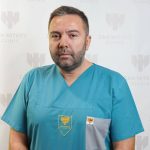 00389 2 3091 484
00389 2 3091 484
МЕДИЦИНСКИ УСЛУГИ
Internal medicine
Diseases and conditions
The internal medicine specialty focuses on prevention, diagnosis and treatment of the adult population diseases.
Without focusing exclusively on one part of the body or one organ system, the internal medicine specialist covers the diagnostics and treatment of the entire organism and treats both common and more complex and more severe diseases in adult patients. Often, an internal medicine specialist takes care for an individual during all their life stages. Diagnosis and treatment of the diseases can be performed in the internal specialist’s office or in the hospital, depending on the severity of the disease which is treated.
Internal medicine specialists are trained in diagnostics and treatment of a wide range of diseases in adults. The internal medicine specialists may focus on general practice or specialized area. The internal medicine specialists are also working in hospitals where they can treat adults with most common diseases and in preventive medicine.
Examinations
Internal medicine specialists apply numerous investigations and examinations depending on the individual needs of the patient, their disease, age etc., therefore they can vary significantly.
A routine physical examination is an essential part of the introduction of the physician in the general investigation of the patient. The internal medicine specialist takes a detailed anamnesis and performs a general examination of the patient.
The physician becomes familiar with the patient’s habits such as the lifestyle, smoking, diet, taking medications, alcohol and physical activity. The physician also performs manual examination of the thyroid gland, urogenital tract, inspection and palpitation of the abdomen, auscultation of the heart, auscultation of the lungs and general neurological examination.
Even before the patient reports some signs and diseases, the internal medicine specialist can refer them to specific investigations in order to diagnose the disease. Most frequent such investigations include:
- Cholesterol and lipids in blood levels: laboratory investigations after 10-hour fasting, risk factor for cardiovascular diseases.
- Identifying individuals with high blood pressure, risk factor for cardiovascular diseases.
- Identifying thyroid gland diseases: T3, T4, TSX in blood
- Obesity, determining the body mass index (BMI) and treatment of the obesity.
- Diabetes, measuring of fasting glycose level, oral glycose tolerance test (OGTT) and glycated hemoglobin (HbA1C).
- Ultrasound examination of the internal organs, general echocardiographic examination of the kidneys, bladder, liver, gallbladder, thyroid gland
- Spirometry, measuring of the capacity of the breathing function and screening of COPD patients (chronic obstructive pulmonary disease) and asthma
- Breast cancer in the female population, referral to mammography.
- Colorectal carcinoma, there are several screening options for this type of cancer, especially in the population at risk and in case of family anamnesis.
- Prostate cancer, identifying PSA as a specific screening test.
Generally, the further quality of life of the patient and the proper treatment of the existing diseases depend on the quality of the examination and proper recommendations given to the patient.
24-hour sleep apnea monitoring – polysomnography
Polysomnography is a test used for diagnostics of the breathing disorders when sleeping. The monitoring registers the possible pauses in the breathing, the saturation of the blood with oxygen, heart pulse, as well as movements of the chest. This monitoring is performed during the night and in the patient’s home.
Sleep apnea is a medical condition with possible severe complications:
- Severe fatigue during the day due to obstructed sleep during the night
- High blood pressure or heart problems (increases the risk of heart attack, stroke and irregular heart beat)
- Type 2 diabetes and metabolic syndrome
- Possible complications from the medications used during general anesthesia during surgery
- Liver problems
- Deterioration of relationships because of snoring.
Other doctor’s from this department

Vilma Ampova Sokolov MD
Specialist in internal medicine - subspecialist cardiology
vilma.ampova@zmc.mk

Prof. Borche Georgievski, MD, PhD
Specialist in internal medicineSubspecialist in hematology
borche.georgievski@zmc.mk

Ass. Prof. Tanja Angjusheva MD
Specialist in internal medicine
Subspecialist in cardiology
tanja.anguseva@zmc.mk

Borjanka Georgieva MD
Specialist in internal medicine
Subspecialist in cardiology
borjanka.georgieva@zmc.mk

Prof. Ninoslav Ivanovski MD, PhD
Specialist in internal medicine
Subspecialist in nephrology
ninoslav.ivanovski@zmc.mk

Enver Idoski MD
Internal Medicine SpecialistSub spec. in cardiology
enver.idoski@zmc.mk

Shpend Idrizi MD
Specialist in internal medicineSubspecialist cardiology
shpend.idrizi@zmc.mk

Prof. Milka Klincheva MD, PhD
Specialist in internal medicinesubspecialist in cardiology
milka.klinceva@zmc.mk

Katerina Ristoska MD
Specialist in Internal MedicineSub Specialty in Nephrology
katerina.ristoska@zmc.mk

Liljana Hadji – Pecova MD
Internal medicine specialist Hematology subspecialist
liljana.hadzi-pecova@zmc.mk






